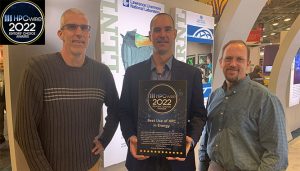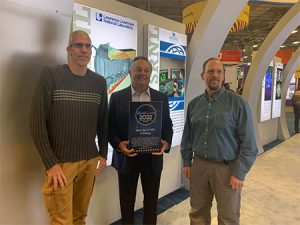The high performance computing publication HPCwire announced Lawrence Livermore National Laboratory (LLNL) as the winner of its Editor’s Choice award for Best Use of HPC in Energy for applying cognitive simulation (CogSim) methods to inertial confinement fusion (ICF) research.

The award was presented Tuesday at the largest supercomputing conference in the world: the 2022 International Conference for High Performance Computing, Networking, Storage, and Analysis (SC22) in Dallas. The list of winners was revealed at the SC22 HPCwire booth, as well as here on the HPCwire website.
Members of the CogSim team include LLNL researchers Brian Spears, Timo Bremer, Luc Peterson, Kelli Humbird, Rushil Anirudh, Brian Van Essen and others (see below for a full list).
The award recognizes the team for progress in their machine learning-based approach to modeling ICF experiments performed at the National Ignition Facility (NIF) and elsewhere, which has led to the creation of faster and more accurate models of ICF implosions.
“We’re really grateful to HPCwire and the editors,” Spears said. “I’m particularly grateful to the wonderful team that we have used to build the tools and techniques over the years. What’s most exciting to me and the rest of the team is that we’ve worked very hard to build AI into a tool that can bridge high-performance computing and experimental work and put that together into something that’s actually functional for science. To have the HPC world recognize that these aren’t just tools with prospects but they’re actually in the world and doing work now — being recognized feels like some external validation that, while it wasn’t necessary, is super great to have.”
“It’s really a large thrust from many different projects all working together — energy, fusion, CogSim — so it’s really awesome to see people from physics to computer science workflows all working together to get this done,” Bremer said. “And then to have this recognized is really a great honor.”
Added Van Essen: “The ability to work with this multidisciplinary team to develop these novel models and methods for scaling the training of deep neural networks for strategically important science is an absolute blast and a highlight of working at the national laboratories. We are excited and grateful to the editorial team at HPCwire for recognizing our work.”
The CogSim work addresses the need for better models that can fully utilize available datasets, can accurately estimate uncertainty and can improve with additional data. Traditionally, due to the cost and complexity of experiments, researchers have had to rely heavily on simulations to design new high-performing implosions. ICF simulations must make simplified assumptions (which can lead to errors) and require integrating data from past experiments to better predict future performance.
Emerging at LLNL over the past several years, the CogSim technique uses the Lab’s cutting-edge HPC machines to combine deep neural networks with the massive databases of historical ICF experiments to calibrate the models. Applying CogSim to ICF research has resulted in faster, better-performing models that can predict experimental outcome with higher accuracy than simulations alone and with fewer experiments, according to researchers.
Much of the CogSim work has been done on HPC machines including Sierra, Lassen and Corona, using Merlin, a custom deep-learning workflow tool, as well as the Livermore Big Artificial Neural Network toolkit (LBANN), an open-source, deep-learning training framework that is optimized for HPC.
Most recently, CogSim team members won the 2022 Transactions on Plasma Science Best Paper Award for their work applying a deep neural-network technique called “transfer learning” to ICF simulations. Transfer learning involves using a model trained to solve one task and partially retraining it on a sparse dataset to solve a different problem.

The team, led by Humbird, trained neural network models on large databases of ICF simulations and partially retrained them on experimental data to calibrate the models. They found the approach produced more accurate predictions and required much less data than the initial training, reducing errors in some cases from over 100% down to less than 7%.
“It’s a wonderful surprise to receive such a prestigious award from the HPC community,” said Humbird. “The work we do in the CogSim teams is built on the foundation of high throughput simulation, but generating that simulation database is often the first step with the ultimate goal of producing state-of-the-art neural-network models. As someone who focuses primarily on the neural-network end of the workflow, it’s easy to forget how truly incredible it is to have tools like Merlin, and machines like Sierra, at our fingertips. Receiving this award is a great opportunity to reflect on how far we’ve come since our first ICF ensemble on the Trinity supercomputer seven years ago, and to look forward to the big plans we have in store for El Capitan.”
CogSim teams have demonstrated improved performance for a range of ICF experiments at NIF, creating models capable of predicting the outcome of experiments with less than 10% error for several key observables. Through cognitive simulation and transfer-learning methods, the team has built an improved experimental prediction pipeline that corrects simulation models using all the fusion experiments at NIF, improving in accuracy as more data is acquired.
In 2019, a research team led by Peterson successfully applied Merlin to generate a massive 100-million ICF implosion simulation run using the entire IBM/NVIDIA supercomputer Sierra, the largest multi-modal network ever trained. The work enabled scientists to better understand the structure of data and improve the predictive models of ICF implosions.
“Pushing the boundaries of HPC with AI has been a rollercoaster — tons of fun and full of ups and downs — but CogSim represents the best of what can happen when a diverse group is given the freedom to play around and try something new,” Peterson said. “I’d like to thank everyone who has supported these efforts, especially the HPC centers at LLNL, and the Los Alamos, Lawrence Berkeley and Oak Ridge national laboratories, who have all generously let us tinker with (and at times break) their systems. The trust we’ve been given to do great science means so much more than this award, which is also pretty cool.”
In a 2020 paper, LLNL researchers led by Anirudh reported on the development of a deep learning-driven Manifold & Cyclically Consistent (MaCC) surrogate model incorporating a multi-modal neural network capable of quickly and accurately emulating complex scientific processes, including ICF.
The research team applied the model to ICF implosions, whose energy yields are typically predicted by a computationally expensive numerical simulator. Comparing the neural network-backed surrogate to the existing simulator, the team found the surrogate could adequately replicate the simulator, and significantly outperformed the current state-of-the-art in surrogate models across a wide range of metrics.
“I’ve always felt like the ICF-CogSim efforts at the Lab are an ideal sandbox for developing scientific machine learning,” Anirudh said. “There are so many diverse, challenging problems that require us to work out solutions from first principles, with the potential for a massive scientific payoff. This award is a reaffirmation that the work is impactful and I’m very excited to continue working on these challenges.”
“This project is a poster example of how artificial intelligence and HPC can play a critical role towards the advancement of science and the society at-large,” said co-author Jay Thiagarajan. “We are at an opportune moment where computing technologies are enabling unprecedented capabilities and it is great to be part of this cutting-edge collaboration at LLNL.”
In recent years, CogSim researchers have used Sierra’s companion machine Lassen, which has been integrated with Cerebras Systems’s CS-1 AI accelerator — the world’s largest computer chip — to further investigate the CogSim approach on ICF experiments. LLNL researchers use a radiation hydrodynamics code called HYDRA and an interface, the Hydra Python Deck, to combine millions of ICF simulations and experimental data quickly and with human intervention. The process has allowed the team to validate the models and predict the outcome of real-world experiments faster and with greater accuracy, researchers said.
Researchers said they hope that with CogSim-driven models, they will be able to better predict future ICF experiments, find new optimal implosion designs and reduce the cost and time associated with producing targets and running real-world experiments on NIF.
CogSim is supported by a Director’s Initiative, led by principal investigator Spears and funded through the Laboratory Directed Research and Development (LDRD) program. The initiative aims to advance a wide range of AI technologies and computational platforms specifically designed to improve scientific predictions by more effectively coupling precision simulation with experimental data.
In addition to ICF, CogSim is being applied to research areas including COVID-19, uncertainty quantification, weapons physics design, magnetic confinement fusion and other laser projects. The work is also part of a broader Department of Energy effort to discover, design, manufacture and deploy AI and machine learning into every stage of a project.
The annual HPCwire Readers’ and Editors’ Choice Awards are determined through a nomination and voting process with the global HPCwire community, as well as selections from the HPCwire editors. The awards are an annual feature of the publication and constitute prestigious recognition from the HPC community. They are revealed each year to kick off the annual supercomputing conference, which showcases high-performance computing, networking, storage and data analysis.
Other LLNL CogSim team members include Shusen Liu, Jim Gaffney, Bogdan Kustowski, Gemma Anderson, Francisco Beltran, Michael Kruse, Sam Ade Jacobs, David Hysom, Jae-Sung Yeom, Peter Robinson, Jessica Semler, Ben Bay, Scott Brandon, Vic Castillo, David Domyancic, Richard Klein, John Field, Steve Langer, Joe Koning, Michael Kruse, Dave Munro and Robert Hatarik.
Source: Jeremy Thomas, LLNL




























































